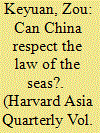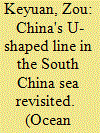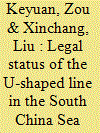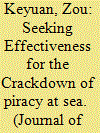| Srl | Item |
| 1 |
ID:
106563


|
|
|
| 2 |
ID:
110839


|
|
|
|
|
| Publication |
2012.
|
| Summary/Abstract |
Despite its existence on the Chinese maps for more than six decades, the U-shaped line, as a traditional maritime boundary line of China in the South China Sea, has never received a wide recognition in the world community, much less by the other claimant states in the South China Sea. The U-shaped line is a legal conundrum not only for China but also for the world community, particularly after the map with the U-shaped line, together with China's Notes Verbale with respect to the claims to the outer continental shelves made by Malaysia and Vietnam, were submitted to the UN Commission on the Limits of Continental Shelf in May 2009. This article discusses China's recent practice relating to the U-shaped line as well as the external factors that affect the validity of the line and tries to unravel the legal puzzle posed by the line.
|
|
|
|
|
|
|
|
|
|
|
|
|
|
|
|
| 3 |
ID:
116553


|
|
|
|
|
| Publication |
2012.
|
| Summary/Abstract |
In State practice, it is common for coastal States to claim maritime geographic features based on the principle of "land dominating the sea". International law recognizes such State practice as long as the related claims are consistent with the applicable international legal norms and rules. While it is relatively clear and recognizable that coastal States have the right to claim geographic features above the water, it remains controversial and unclear whether coastal States could have the right to claim submerged geographic features. It is the purpose of this article to discuss the issues concerning the claims to maritime geographic features to see whether a clearer way can be found to sort out the issues or whether these issues will remain a conundrum to international lawyers as well as to the whole international community.
|
|
|
|
|
|
|
|
|
|
|
|
|
|
|
|
| 4 |
ID:
137763


|
|
|
|
|
| Summary/Abstract |
The U-shaped line in the South China Sea has been recently challenged in the international community and this challenge reached its climax when the Philippines presented China with a Notification and Statement of Claim under Article 287 and Annex VII of the 1982 United Nations Convention on the Law of the Sea (LOS Convention) on 22 January 2013. In its Statement of Claim, the Philippines requests the Annex VII Arbitral Tribunal to adjudge and declare that China's maritime claims based on the U-shaped line are contrary to the LOS Convention and invalid. Against this background, this article will analyze the issues concerning the related submissions of the Philippines.
|
|
|
|
|
|
|
|
|
|
|
|
|
|
|
|
| 5 |
ID:
182584


|
|
|
|
|
| Summary/Abstract |
Many States in the world such as China have no specific domestic laws providing for the crime of piracy, leading to the question whether these States have the competence to punish piracy as required by international law. This paper argues that the lack of a crime of piracy within a domestic legal system should not become an insurmountable obstacle for States to prosecute pirates. Prosecution of pirates without a crime of piracy is feasible in a State that has domestic criminal laws that deal with illicit activities similar to piracy by indicting perpetrators with other criminal offences. While it would be an ideal solution for that State to establish a specific crime of piracy in its domestic legal system, it is important to consider the difficulties in setting the definition of piracy and the degree of punishment appropriately, and realize that the major deficiencies in punishing pirates under other existing domestic crimes can be basically addressed within an existing domestic legal system. The main purpose of universal jurisdiction over piracy to punish criminals to the maximum extent and the changing situation of piracy also require States to always be ready to deal with piracy. Therefore, prosecuting pirates as another crime is a realistic compromise. Furthermore, for a State without a crime of piracy, it is more urgent for it to build up legal grounds for exercising universal jurisdiction over piracy and relevant procedural provisions on the exercise of extraterritorial jurisdiction over international crimes at sea.
|
|
|
|
|
|
|
|
|
|
|
|
|
|
|
|
| 6 |
ID:
067227


|
|
|